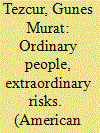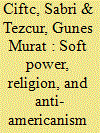|
|
|
Sort Order |
|
|
|
Items / Page
|
|
|
|
|
|
|
| Srl | Item |
| 1 |
ID:
134566


|
|
|
|
|
| Summary/Abstract |
This article argues that long-term changes in Turkish foreign policy are primarily due to the diversification of the country's political and economic interests. Important international structural shifts such as the end of the Cold War or the broad fluctuations in oil prices have constituted the initial impetus for the changes that we have seen in Turkish policies. Discussing alternative perspectives on new activism in Turkish foreign policy, the article gauges Turkey's foreign policy affinity (based on voting patterns in the United Nations General Assembly) and trade with other states to place recent trends in the broader context of the past three decades. It shows that, as the “West” has become less coherent in its policies, Turkey has moved closer to EU members and distanced itself from the US. The data also undermine “shift of axis” arguments as Turkey's foreign policy affinity with Middle Eastern countries has, in fact, declined. The trade data reveal a diversification of the country's commercial interests that contribute to Turkey's increasing regional activism. The country now balances its long term European interests with its recent regional ones.
|
|
|
|
|
|
|
|
|
|
|
|
|
|
|
|
| 2 |
ID:
144446


|
|
|
|
|
| Summary/Abstract |
This study analyzes the effects of political violence on electoral behavior by focusing on one of the longest lasting ethnic conflicts in contemporary times, the Kurdish insurgency in Turkey. How do armed conflict and electoral institutions shape turnout in a civil war context? Building on an original data-set at the sub-national level, the study reaches two major conclusions. First, it shows rural displacement caused by political violence led to lower levels of turnout and severely hampered access to voting controlling for a wide range of socioeconomic and electoral system variables. Second, an unusually high electoral threshold aggravated this pattern of disenfranchisement and limited the avenues of nonviolent Kurdish political activism with negative implications for the resolution of the conflict.
|
|
|
|
|
|
|
|
|
|
|
|
|
|
|
|
| 3 |
ID:
147238


|
|
|
|
|
| Summary/Abstract |
Why do ordinary people take extraordinary risks and join an ethnic armed rebellion? This article tests a series of well-established hypotheses about selfish and identity based motivations and a new hypothesis based on prospect theory. It then employs a unique multimethod research strategy combining one of the most comprehensive datasets on insurgent recruitment that contains biographical information about 8,266 Kurdish militants with extensive fieldwork involving in-depth interviews with relatives of the militants to test these hypotheses. The findings show the decision to rebel is as much political as economic and social. While security concerns and expectations of benefits affect the decision to rebel, social commitments, identities radicalized by state repression, and collective threat perceptions among efficacious individuals generated by political mobilization, rather than preexisting ethnic cleavages, also lead to participation in an ethnic insurgency. The latter findings explain the durability of insurgencies with limited economic resources and their ability to attract educated fighters.
|
|
|
|
|
|
|
|
|
|
|
|
|
|
|
|
| 4 |
ID:
146345


|
|
|
|
|
| Summary/Abstract |
This study presents the first systematic analysis of the public opinion dimension of soft power competition in the contemporary Middle East. Building on the scholarship on perceptions of foreign states and Arab public opinion, it proposes a series of hypotheses about sectarian identity, religious worldviews, and anti-Americanism as determinants of attitudes toward Turkey, Iran, and Saudi Arabia in the context of regional rivalry. It then presents multivariate probit estimations utilizing Pew Global Attitudes Survey to test these hypotheses. The findings suggest that religious identity and worldviews directly affect favorability ratings of these three powers in the Arab Middle East. While Sunnis favor Saudi Arabia and Turkey over Iran, religious individuals demanding Islamic law favor the Islamic Republic. Furthermore, anti-Americanism translates into lower support for Saudi Arabia and Turkey, but greater support for Iran. Democratic attitudes have no influence over perceptions of these three powers indicating the limits of democracy promotion as a foreign policy tool.
|
|
|
|
|
|
|
|
|
|
|
|
|
|
|
|
| 5 |
ID:
114235


|
|
|
|
|
| Publication |
2012.
|
| Summary/Abstract |
This article offers an analysis of basic trends in the post-1980 Turkish party system. How has the Turkish party system evolved during the last eight elections? How do these characteristics change with the rise of the Justice and Development Party (AKP, Adalet ve Kalkinma Partisi)? Utilizing statistical methods informed by fieldwork conducted during the parliamentary elections of 2002, 2007, and 2011, the article suggests that Turkish elections exhibit unmistakable patterns of regionalization, which in turn have strongly contributed to the AKP's electoral ascendancy. Barring external shocks such as major economic crisis or leadership replacement, these regional patterns make it difficult for the opposition parties to effectively challenge the AKP.
|
|
|
|
|
|
|
|
|
|
|
|
|
|
|
|
|
|
|
|
|